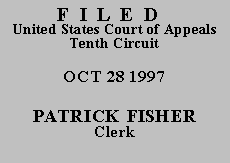

| ERNEST DERVON LINDSEY, JR.,
Petitioner-Appellant, v. RON CHAMPION, Respondent-Appellee. |
|
Petitioner seeks review of the district court's order denying his petition for habeas relief under 28 U.S.C. § 2254. Before petitioner can proceed on appeal, however, he must secure a certificate of probable cause from this court, pursuant to 28 U.S.C. § 2253.(1) Based upon our review of the record as a whole, we conclude that petitioner has failed to make a substantial showing of a denial of a constitutional right.
We, therefore, DENY the application for a certificate of probable cause, and DISMISS the appeal.
The mandate shall issue forthwith.
Entered for the Court
Circuit Judge
*. This order and judgment is not binding precedent, except under the doctrines of law of the case, res judicata, and collateral estoppel. The court generally disfavors the citation of orders and judgments; nevertheless, an order and judgment may be cited under the terms and conditions of 10th Cir. R. 36.3.
**. The Honorable J. Thomas Marten, District Judge, United States District Court for the District of Kansas, sitting by designation.
1. Because petitioner filed his habeas petition in 1995, before enactment of the Antiterrorism and Effective Death Penalty Act of 1996 (AEDPA), Pub. L. No. 104-132, 110 Stat.1214, AEDPA's certificate of appealability requirements do not apply to this appeal. See United States v. Kunzman, ___ F.3d ___, No. 96-1310, 1997 WL 602507, at *1 n.2 (10th Cir. Oct. 1, 1997). Instead, the pre-AEDPA certificate of probable cause requirements apply here. Regardless of the label we attach to the requirements, petitioner's substantive burden is the same, see Lennox v. Evans, 87 F.3d 431, 434 (10th Cir. 1996), cert. denied, 117 S. Ct. 746 (1997), overruled in part by, Kunzman, 1997 WL 602507 at *1 n.2, so we will construe his application for a certificate of appealability as an application for a certificate of probable cause.